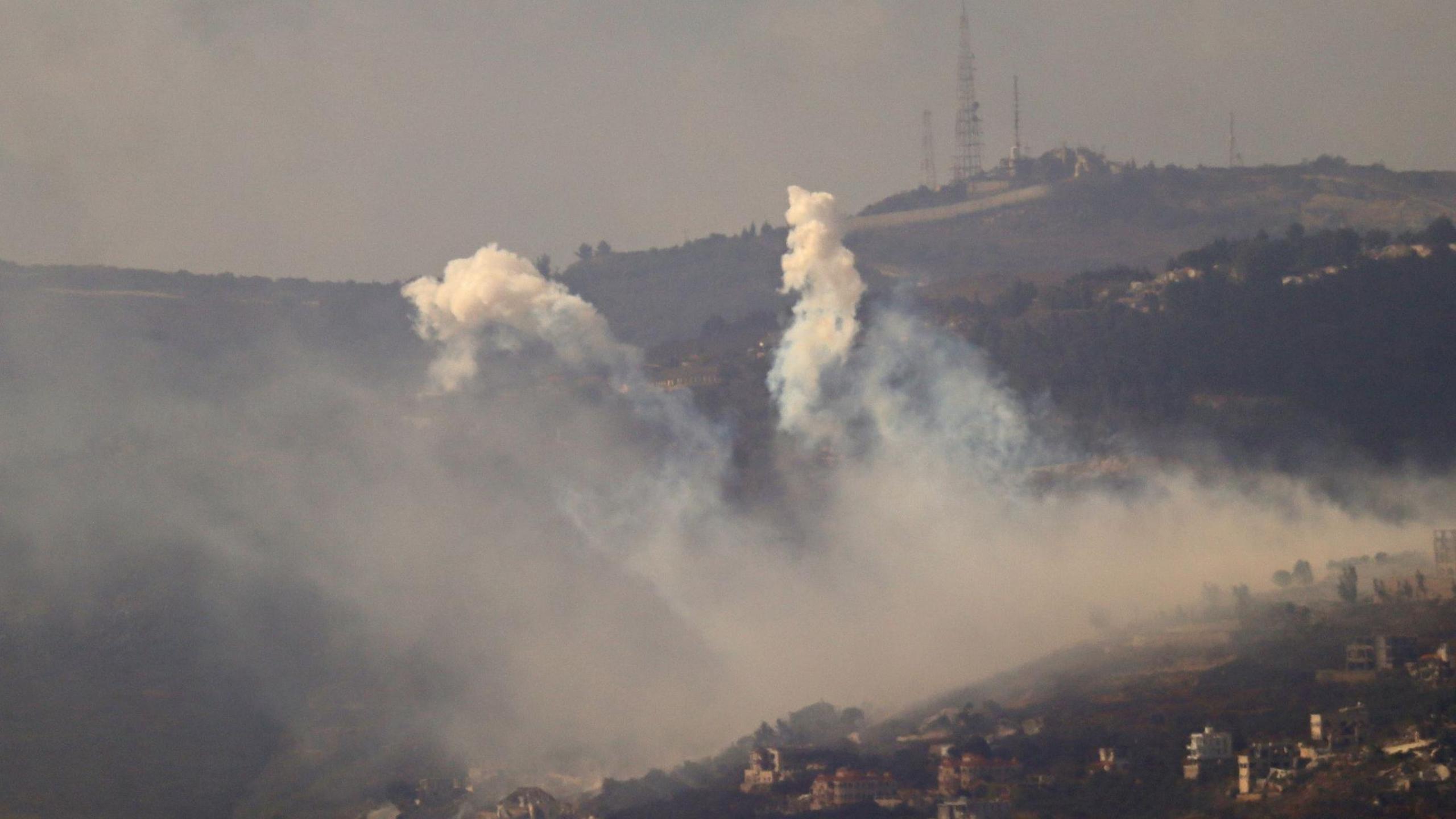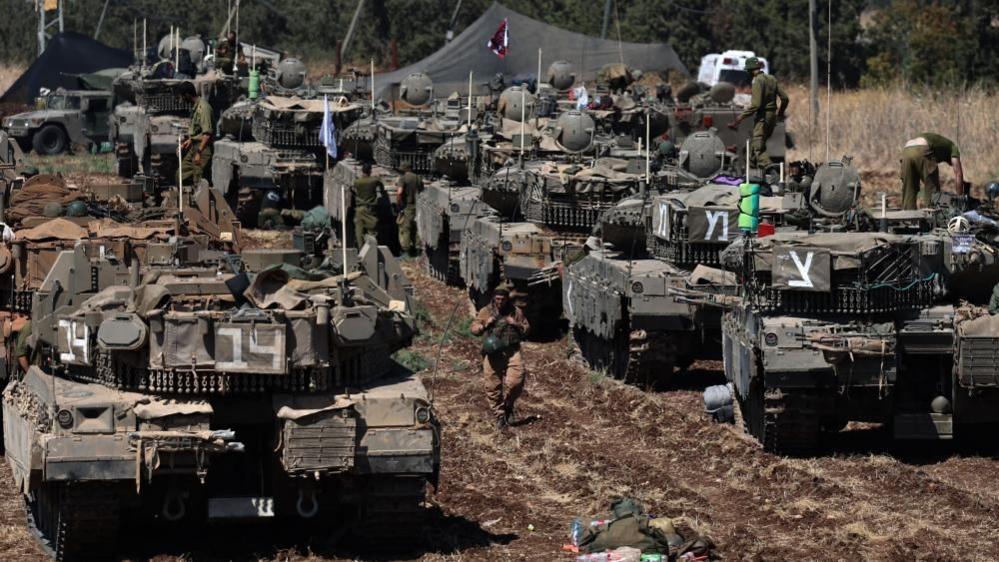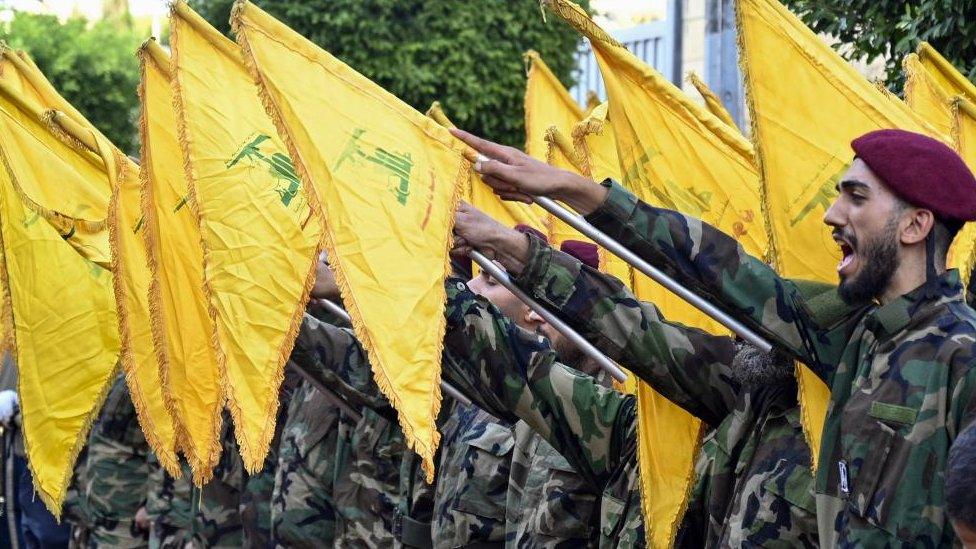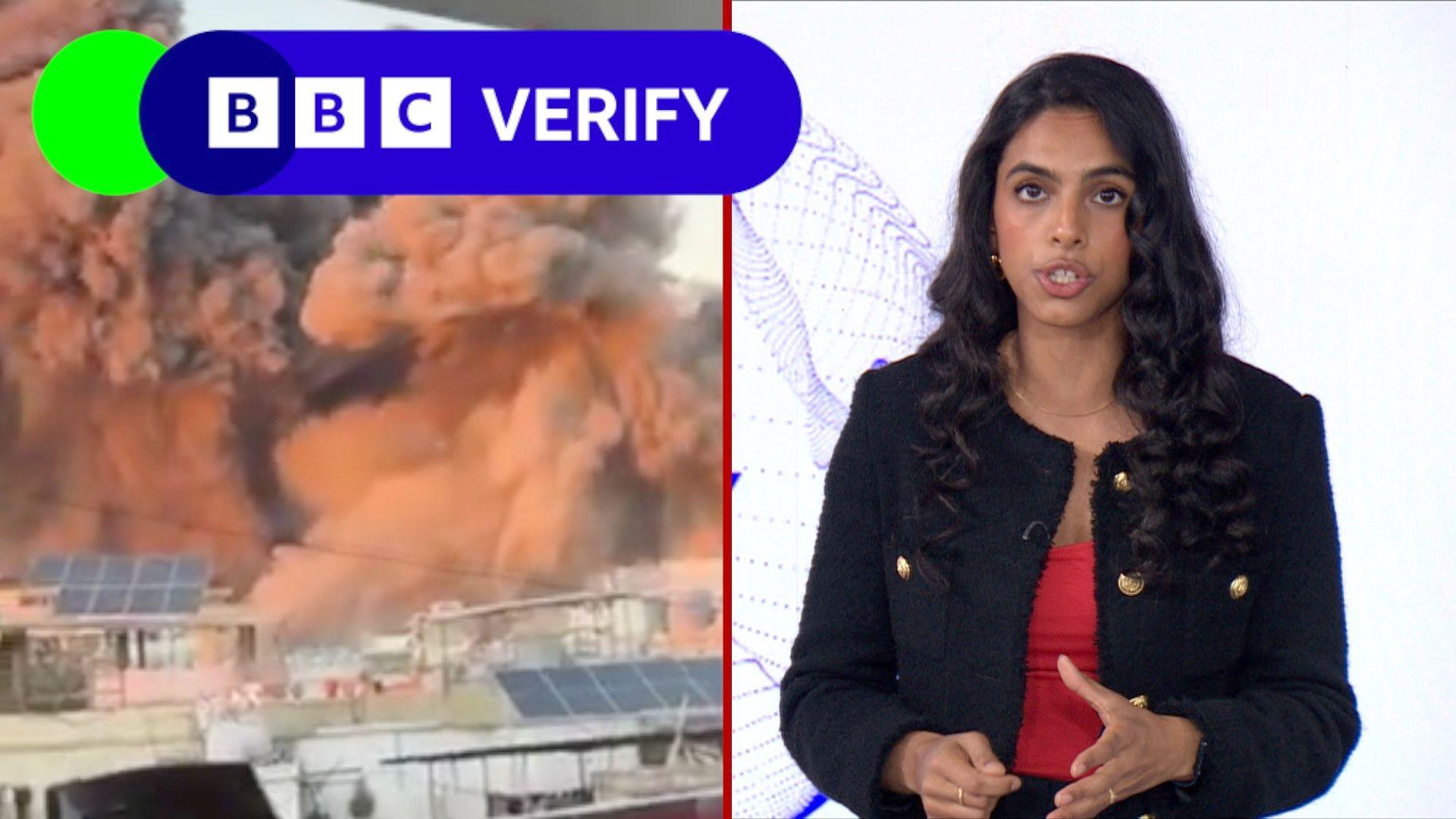Israel launches ground invasion in Lebanon

The site of Israeli artillery shelling on the Lebanese villages of Adeisseh and Kfar Kila along the border with Israel
- Published
Israel has launched a ground invasion in southern Lebanon, in what it has described as "limited, localised and targeted" raids against Hezbollah.
Lebanese civilians are being warned not to use vehicles to travel south across the Litani river, located 20 miles north of the Israel-Lebanon border, and residents in around 25 villages have been told to evacuate and head north.
According to the Israel Defense Forces (IDF), the operation is aimed at the Iran-backed group's "infrastructure", which it says poses "an immediate threat to Israeli communities in northern Israel".
An Israeli senior security official told the BBC earlier that ground forces had only ventured a "very close walking distance" into Lebanon, but Hezbollah deny claims that troops are in the country.
The militant group said its fighters were "ready for a direct confrontation" but there had been no direct clashes between them and Israeli forces, a claim confirmed to the BBC by an Israeli source.
Hezbollah has also claimed to have fired at the headquarters of Mossad, the international arm of Israel's intelligence service, in Tel Aviv.
Meanwhile, Israeli airstrikes in Lebanon are continuing.
Israel's Defence Minister Yoav Gallant previously implied the army was ready for a ground operation, telling troops near the Lebanese border Israel was prepared to use forces "from the air, sea and land" to target Hezbollah.
In a statement posted on X, external at 02:00 local time on Tuesday morning, the IDF confirmed troops had moved across the border following a build-up of tanks and other armour in northern Israel.
The Lebanese army is pulling back troops stationed on its southern border to at least 5km (3 miles) north, according to Reuters news agency, which cited a Lebanese security source.
Lebanon's prime minister, Najib Mikati, said on Tuesday that his country was facing "one of the most dangerous phases" in its history.
Around one million people had been displaced across Lebanon since Israeli air strikes began last month, he added.
Speaking during a meeting with United Nations organisations, Mikati issued an "urgent call" for more aid to help support them.
The IDF's Arabic spokesperson Avichay Adraee has also listed 25 villages in southern Lebanon, telling residents there to evacuate immediately.
He added: "Any home used by Hezbollah for its military needs is expected to be targeted."
On Monday, Gallant told Israeli troops at the border that Israel's military would use all "the means at our disposal" to allow displaced people to return home in the north of the country.
In a short video, he said the "elimination" of Hezbollah leader Hassan Nasrallah in Beirut on Friday "is a very important step, but it is not everything".
He added that "everything that needs to be done - will be done" and that "we will use all the forces from the air, sea and land".
The Israeli government has pledged to make it safe for tens of thousands of its citizens to return to their homes after nearly a year of cross-border fighting, which began with Hezbollah firing rockets at the start of the war in Gaza.
The Lebanese armed group - which is proscribed as a terrorist organisation by the US, UK and other countries - is known to have extensive tunnel networks as well as bunkers and other military infrastructure just over the border from Israel.
Hezbollah's deputy chief Sheikh Naim Qassem said the group - which is thought to have tens of thousands of well-trained fighters - was ready for an Israeli ground offensive. He described their attacks on Israel so far as the "minimum", adding that the battle could be long.
Hezbollah - which is backed by Iran - has experienced mass casualties from exploding pagers and walkie-talkies, a wave of assassinations of its military commanders and devastating air strikes which have killed civilians, as well as the use of bunker-busting bombs in Beirut, which killed the group's leader, Hassan Nasrallah, on Friday.
Explosions lit up the night sky on Monday as airstrikes hit Hezbollah’s stronghold of Dahieh, in Beirut's southern suburbs, near the airport.
The attacks came shortly after the Israeli military warned residents to evacuate buildings it said were linked to the group.
In southern Lebanon, there were reports of heavy shelling in the border town of Aita al-Shaab.
And near the city of Sidon, officials say a strike hit a building in a crowded Palestinian refugee camp, the first time it has been attacked in this conflict.
Lebanese officials say more than 1,000 people have been killed in the past two weeks, while around a million may now be displaced.
On Monday, US President Joe Biden said "we should have a ceasefire now".
"I'm more aware than you might know and I'm comfortable with them stopping," Biden told reporters when asked if he was comfortable with Israeli plans for a cross-border incursion.
UK Foreign Secretary David Lammy spoke to his US counterpart Antony Blinken on Monday, with the US State Department saying they discussed efforts to resolve the conflict. Both men stressed the need for a ceasefire and that the hostages taken by Hezbollah's Palestinian ally Hamas in the 7 October attack on Israel need to be returned home.
The European Union's member states have called for an urgent meeting of the UN Security Council. EU foreign policy chief Josep Borrell said "any further military intervention would dramatically aggravate the situation and it has to be avoided".

Israeli tanks had been assembling close to the border with Lebanon for several days in advance of the ground incursion
Meanwhile, Israel and Hamas have both confirmed the killing of the head of Hamas in Lebanon, Fateh Sherif Abu el-Amin, in Israeli strikes in southern Lebanon.
Israel's military said Sherif was "responsible for co-ordinating Hamas's terror activities in Lebanon with Hezbollah operatives".
Another Israeli strike in the central Beirut neighbourhood of Kola early on Monday killed three members of the Popular Front for the Liberation of Palestine (PFLP), the Palestinian armed group said in a statement.
The statement named those killed as military security chief Mohammad Abdel-Aal, military commander Imad Odeh and fighter Abdel Rahman Abdel-Aal.
The previously sporadic cross-border fighting between Israel and Hezbollah escalated on 8 October 2023 - the day after the unprecedented attack on Israel by Hamas gunmen from the Gaza Strip - when Hezbollah fired at Israeli positions, in solidarity with the Palestinians.
Related topics
- Published14 February

- Published28 September 2024
